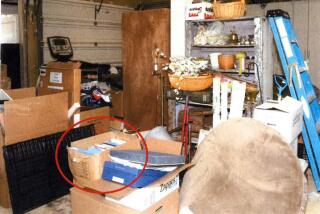Walsh’s Use of Weinberger Notes Assailed : Iran-Contra: Bush supporters see ‘a cheap shot’ in the prosecutor’s use of data that seems to contradict the President’s statements on the scandal.
- Share via
WASHINGTON — The eleventh-hour release of former Defense Secretary Caspar W. Weinberger’s notes of a key Iran-Contra meeting is feeding perceptions by President Bush’s supporters that the President was a victim of an unfair political maneuver.
Even before voters went to the polls Tuesday, Bush’s backers were charging that independent counsel Lawrence E. Walsh had taken “a cheap shot” by using a new indictment of Weinberger four days before the election to challenge Bush’s Iran-Contra denials.
The indictment included notes made by Weinberger after a Jan. 7, 1986, White House meeting on the arms-for-hostages deal.
Bush was clearly angered by release of the notes, which seemed to contradict his assertion that he was “out of the loop” when then-President Ronald Reagan launched the secret deal with Iran. In a weekend interview on CNN, Bush declined to rule out firing Walsh if he were reelected.
The charge came only days after some polls showed Bush surging. By Sunday, the same polls had Clinton with a comfortable lead again. Some Bush backers blame the apparent turnaround on release of the Iran-Contra notes.
An exit poll conducted Tuesday by The Times, however, found that, although voters considered the Iran-Contra affair an important issue in their decision, the late revelations did not substantially increase the damage to Bush.
Bush’s defenders, who have long been critical of Walsh’s six-year investigation, cite the timing of the Weinberger charge and the inclusion of his notes in the indictment. The President’s supporters contend that the notes are not central to the Weinberger allegations.
Weinberger’s notes said: “Met with President (Reagan), (Secretary of State George P.) Shultz, (National Security Adviser John M.) Poindexter, (CIA Director William J.) Bill Casey, (Atty. Gen. Edwin) Meese, in Oval Office. President decided to go with Israeli-Iranian offer to release our 5 hostages in return for sale of 4000 TOWs (anti-tank missiles) to Iran by Israel. George Shultz + I opposed. Bill Casey, Ed Meese + VP (Bush) favored--as did Poindexter.”
A source familiar with Walsh’s thinking contended that he was surprised at the furor over the Bush-Weinberger conflict on grounds that it was already publicly known. The timing of the indictment resulted from the prosecutor’s promise to U.S. District Judge Thomas Hogan to return the new charge by the end of October so that the Jan. 5 trial date would not be postponed, the source said.
But Bush’s defenders, including political appointees at the Justice Department, contend that Walsh could have asked Hogan for permission to hold off the new charge until today without delaying the trial or possibly influencing the election.
The notes were not part of the original indictment of Weinberger, which included an obstruction of Congress charge that Hogan dismissed. In the new indictment, the obstruction charge was replaced with a false statements charge.
The false statements count involves Weinberger’s June 17, 1987, statement, under oath to investigators for the House committee that probed the Iran-Contra scandal, that he had not regularly taken daily notes of his meetings.
Walsh approved including the direct quotation on grounds that prosecutors would not then have to demonstrate in pretrial hearings that they could support a paraphrase, the source said. After the first indictment, prosecutors had to show in pretrial proceedings that they had evidence to back up paraphrases of Weinberger notes, the source said.
But another source familiar with the matter insisted Tuesday that Walsh did not have to include that portion of the Weinberger notes showing him at odds with Bush’s version of events.
“They could have used 100 different references from his notes” instead of the one mentioning Bush, that source said. “It was a cheap shot, putting that in a few days before the election.”
But the source familiar with Walsh’s thinking countered: “The investigation centered on possible illegal acts regarding financing of the Contras and the Iran initiative. It was directly relevant to that.” Weinberger’s lawyer, Robert S. Bennett, said Tuesday that “the inclusion of this note was totally unnecessary, and it is just one more example of where Mr. Weinberger is nothing more than a vehicle for other purposes.”
“Moreover, the note shows again that he was on the right side of the issue,” Bennett said, referring to his argument that Weinberger should never have been charged with any crime because he opposed the arms-for-hostages deal. “He was a hero in this matter.”
More to Read
Get the L.A. Times Politics newsletter
Deeply reported insights into legislation, politics and policy from Sacramento, Washington and beyond. In your inbox twice per week.
You may occasionally receive promotional content from the Los Angeles Times.










